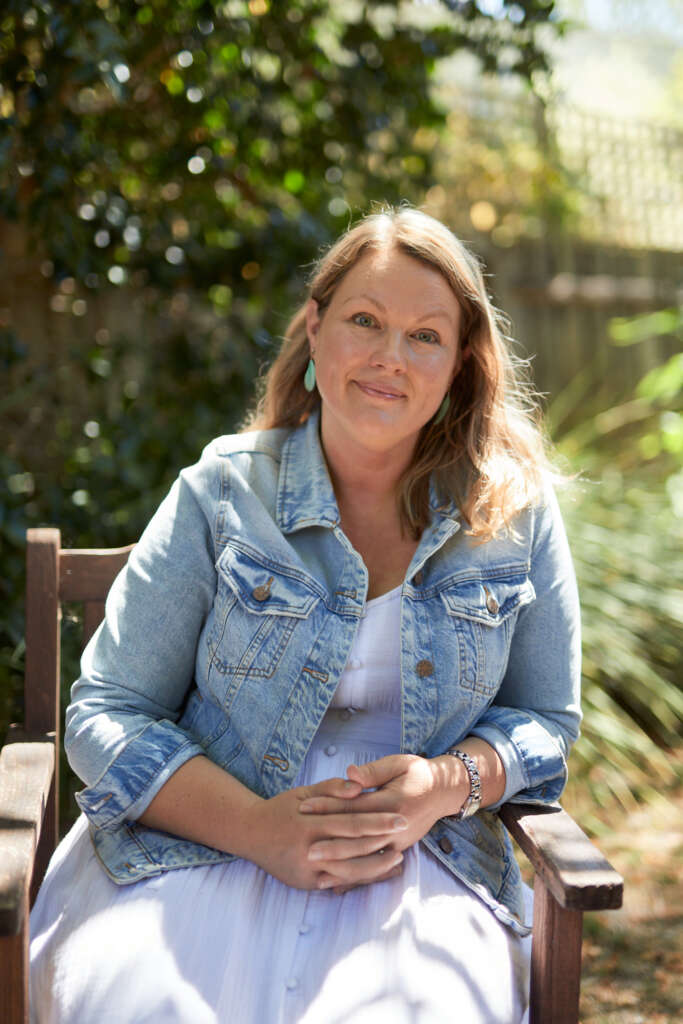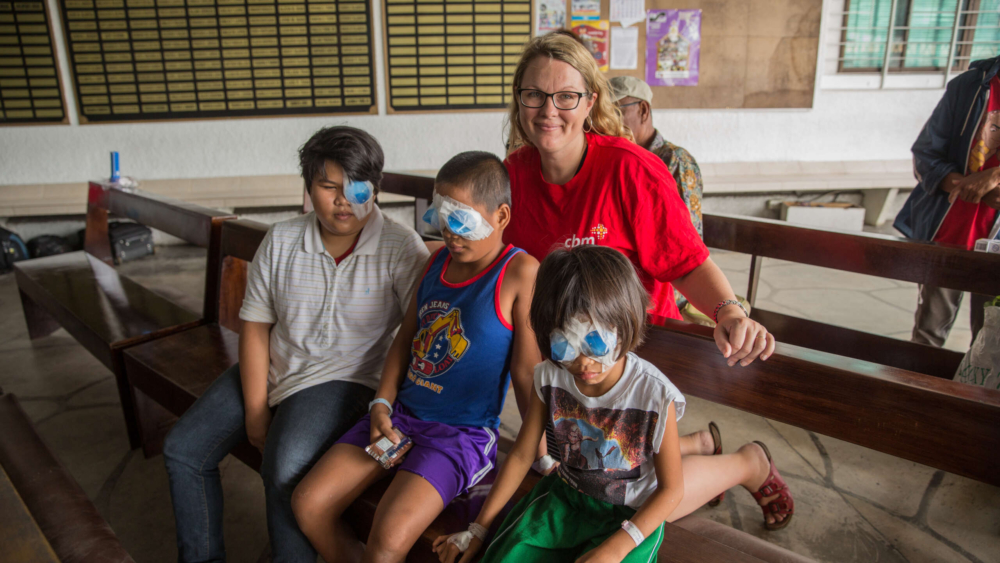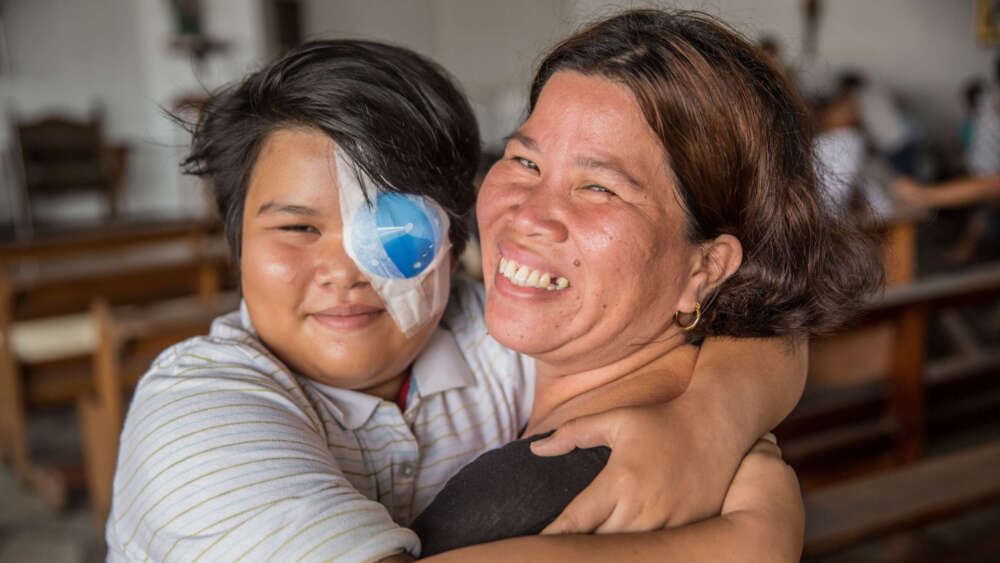Seeing miracles from the inside
Mariska Meldrum has a very special reason for working as campaign manager for CBM’s annual Miracles Day – when Australians give the miracle of sight to people blind from cataracts in the world’s poorest places.
Mariska was born with a congenital cataract blocking almost all of her vision in her right eye.
“I thought I would be blind in my right eye forever, but I received the miracle of sight when I was 35 years old. So having the opportunity to give so many other people this surgery was something that I felt God really leading me to,” explains Mariska, who started leading the Miracles Day campaign in 2017.
“While the majority of people with cataracts are adults who develop them later in life, children can also be born with or develop cataracts. I was born blind and they picked up when I was quite young that I had limited vision in one eye. And so, in my first year of school, I had a patch over my eye to try and keep my eyes nice and straight. Apart from meaning I couldn’t catch a ball and was very uncoordinated, it didn’t affect my life too much until probably my late twenties. Then the cataract matured, turned white, and I lost pretty much all vision.”

Mariska Meldum
Although cataract surgery restored her sight, it was only partial because she didn’t have the operation early enough.
“What we know now is if you reach children early enough, the chance is very high that they’ll get their full vision back, whereas, because mine was left to 35, I’m still really seeing the world out of one eye,” she says.
“That’s made me passionate about CBM’s inclusive eye health work around the world. The majority of people with vision impairment live in developing countries, and there are half a million children who are living needlessly blind. If I can play my part through Miracles Day and inspire Australians to donate to give people the sight-saving surgery they need, that’s something I feel God calls me to do.”
“I remember hearing this gut-wrenching sob … her daughter Joanna had woken up one day and had lost her vision.”
Mariska witnessed the joy and profound transformation that cataract surgery can accomplish just a month after she joined CBM in 2017, after almost 20 years of working for a range of Christian not-for-profits.

Mariska Meldrum with children who have had cataract surgery in the Philippines.
On her first trip to the Philippines, Mariska was talking to a nurse in a waiting room attached to an operating theatre when she noticed someone crying across the room.“I remember hearing this gut-wrenching sob, and I looked over, and it was the mother of a 13-year-old girl. She was explaining to someone that her daughter Joanna had woken up one day and had lost her vision. She’d developed cataracts suddenly in both eyes.”
Mariska spoke to the woman, Frenil, who told her that Joanna was an incredibly smart girl who had taught herself to speak English fluently from a dictionary because she hoped to become a businesswoman. Joanna had just finished grade six top of her class, but when she suddenly lost her sight, the local high school turned her away.
“So she’d sat at home for a year, totally reliant on her mum and they couldn’t afford to pay for cataract surgery,” says Mariska.
“To be there at that moment and go into the operating theatre with Joanna and see her have surgery was life-changing for me. The next day, I was there to see her eye patch come off, and her mum just hugging her and crying.”
“To go into the operating theatre with Joanna and see her have surgery was life-changing for me.”
The surgery not only meant that Joanna could go back to school, but she could also resume her dancing which she loved.
Mariska left the Philippines thinking she would never see Frenil or Joanna again, but she recently found out that Joanna had helped her mum start a business, a little shop, which has helped lift her family out of poverty, and that Joanna had graduated at the top of her class in Year 12. And all thanks to a donation of $33 by a generous Australian – enough to provide a 12-minute surgery to restore her sight.
“For me to see the journey of someone, and see the impact on this one girl, but also on her family has just been incredible, and that’s the beautiful thing about Miracles Day – most Australians can afford to get involved,” she says.
As someone who had very expensive cataract surgery in 2017, I ask Mariska how CBM can provide this surgery in developing countries for just $33 – which, as she says, is less than she spends on a trip to the movies for her children.
She agrees that $33 is a sum most Australians spend without thinking too much about it. But she says this is sufficient to provide cataract surgery in outreach clinics and temporary surgical wards in very remote areas, thanks to generous support from the Australian government and long-term individual donors, which has enabled CBM to build up a vast network of partner hospitals and partner doctors and to equip them to do these surgeries.
“Our partners in places like Nepal do a thousand of these surgeries a week in one of our bigger hospitals,” she says.
“I’ve seen an operating theatre where there are ten patients lined up, and the doctor goes from one to the next to the next, and it seems quite quick and easy, but that expertise is what we really invest in.”
That $33 figure covers not only the surgery but also the outreach programs to locate children and screen them to find out if they have cataracts.
“We also, in some cases, pay for people’s transport to the hospital. And if their family needs to stay overnight, we pay for that because the people we work with are incredibly poor, and that can be a barrier to having surgery.”
“There was a woman in her late-30s who had been blind from birth – she’d never seen any of her family before.”
Having witnessed surgeries in the field, Mariska reports that an adult can usually see instantly afterwards, whereas, for children blind from birth, vision may improve more gradually over the next month as the brain reforms pathways for vision.
“It’s an incredible moment being there when those patches come off. I’ve been hugged, people can’t wipe the smiles off their faces, they’re just so excited to be able to see again,” Mariska says.
“I’ve been there when a mum who had never seen her baby before, saw her baby for the first time. I’ve seen a husband see his wife for the first time. There was a woman in her late-30s who had been blind from birth – she’d never seen any of her family before. There’s so many incredible stories.”
As someone who has experienced the miracle of being able to see out of my right eye after having cataract surgery, this writer can vouch for the fact that it is one of life’s peak moments. It not only restores sight, but you feel less vulnerable and more confident.
This year, Miracles Day is celebrating its 10th anniversary. The event began as a partnership between CBM and Christian radio stations, which wanted to respond to the fact that nine in 10 people who are visually impaired live in developing countries.
“Through Christian radio, we’re able to reach a lot more people with this message, and we’ve seen people just respond and an outpouring of generosity across the nation,” says Mariska.
“Pre-COVID, I used to take radio hosts overseas to broadcast their breakfast shows live from a CBM eye health project. We’ve travelled to the Philippines, Vietnam, Nepal and they share what they’re witnessing to their listeners, as they’re watching people have their sight restored. “
“Over the past ten years, Australians have given more than 300,000 miracles of sight-saving surgery. To think that each of those represents someone like Joanna having their sight restored is just incredible. Even children donate their pocket money, so it doesn’t cost a lot, but the impact is really tangible, and we see these beautiful stories of lives being changed.”
Miracles Day is on August 18, and will be broadcast on 33 Christian radio stations across Australia. Find out more here.
.
Email This Story
Why not send this to a friend?


